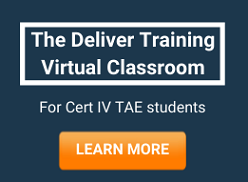Learning Management System › Forums › Assess › Validation assignment
Tagged: Validation of assessment
This topic contains 2 replies, has 3 voices, and was last updated by dylanhyjac@gmail.com 10 years, 9 months ago.
-
AuthorPosts
-
October 15, 2014 at 10:41 am #9042
Hi There,
I am planning to do the validation assignment for the certificate IV in Training and assessment.
Is there anyone of you doing this Training package who has completed the assessment plan assignments and from whom I could work with on one of their assessment instrument they developed ?This is for the validation of an assessment assignment…
Please let me know if interested,
Cheers,
BenedicteOctober 17, 2014 at 9:23 am #9044Good morning Benedicte
Thank you for commencing a discussion on validation.
A good way to tackle to project 3c is to use your project 3b. How do we do that.
What is assessment validation? Assessment validation is a process that compares, evaluates and reviews assessment processes, methods and tools to ensure that the assessment process is fair, valid, reliable and flexible. Validation processes ensure that the assessment tools used validate the assessment process against the benchmark or unit of competency with a focus on achieving consistency in assessment.• Assessment validation is a process that compares, evaluates and reviews assessment processes, methods and tools to ensure that the assessment process is fair, valid, reliable and flexible. Validation processes ensure that the assessment tools used validate the assessment process against the benchmark or unit of competency with a focus on achieving consistency in assessment.
A few things to remember when participating in assessment validation
• Keep accurate and reliable records of the validation process
– Take minutes at all meetings
– Ensure your accuracy in data collection eg: correct competency numbers, names, dates, times etc
– Currency of the assessment document – is it out of date?
• Implement version control
• Know and understand the policies and procedures of the organisation and ensure that the assessment documents conforms to these policies
Participate in validation sessions and activities by applying the principles of
assessment and rules of evidence
Using the rules of evidence and principles of assessment is critical in ensuring that an effective,
efficient and worthwhile validation session takes place.
As discussed previously, the principles of assessment are that the assessment must be;
? Valid – Validity ensures that the assessment can justify what it claims. Evidence supports the
learner and indicates they have the knowledge and skill to perform the task which is being
assessed. Evidence must match the type of performance that is being assessed.
? Reliable – Reliable means that the assessment is consistent. Evidence can be collected
through a variety of different means but the end result should remain the same – that the
learner can undertake the task regardless of how they are asked to perform it, or when they
are asked to perform it.
? Flexible – Flexibility indicates that reasonable adjustment can be carried out to amend the
assessment if necessary for learners with special needs or characteristics. It also indicates
that there is flexibility in when the assessment takes place and where it takes place to
accommodate for the needs of the learners and the trainer.
? Fair – Fair means that no learner is disadvantaged in their assessment. All learners should
understand what is expected from them and advised of all the details relating to the
assessment. All learners and their needs should be catered to in the assessment process.
And the rules of evidence indicate that the evidence to be collected should be;
? Valid – Valid refers to whether or not the evidence collected is a reasonable indication of the
learner completing the required tasks.
? Sufficient – Sufficient indicates whether or not there is enough information for the trainer or
assessor to make an educated decision on whether or not the learner has passed.
? Current – Is the evidence current to the learner and the skills and knowledge that is being
applied?
? Authentic – Authentic refers to the fact that the work must be the learners and not
plagiarised or completed by another person.
•Using project 3c templates, we are going to measure if what you did in project 3b os:
Valid – Validity ensures that the assessment can justify what it claims. Evidence supports the
learner and indicates they have the knowledge and skill to perform the task which is being
assessed. Evidence must match the type of performance that is being assessed.
? Reliable – Reliable means that the assessment is consistent. Evidence can be collected
through a variety of different means but the end result should remain the same – that the
learner can undertake the task regardless of how they are asked to perform it, or when they
are asked to perform it.
? Flexible – Flexibility indicates that reasonable adjustment can be carried out to amend the
assessment if necessary for learners with special needs or characteristics. It also indicates
that there is flexibility in when the assessment takes place and where it takes place to
accommodate for the needs of the learners and the trainer.
? Fair – Fair means that no learner is disadvantaged in their assessment. All learners should
understand what is expected from them and advised of all the details relating to the
assessment. All learners and their needs should be catered to in the assessment process.
and also was:
Valid – Valid refers to whether or not the evidence collected is a reasonable indication of the
learner completing the required tasks.
? Sufficient – Sufficient indicates whether or not there is enough information for the trainer or
assessor to make an educated decision on whether or not the learner has passed.
? Current – Is the evidence current to the learner and the skills and knowledge that is being
applied?
? Authentic – Authentic refers to the fact that the work must be the learners and not plagiarised or completed by another person.October 29, 2014 at 11:47 am #9062Good morning,
I was pondering how to tackle this assignment and stumbled upon this forum post and your reply Robert.
Many thanks, it has answered my questions without me needing to ask them!
Dylan.
-
AuthorPosts
You must be logged in to reply to this topic.









